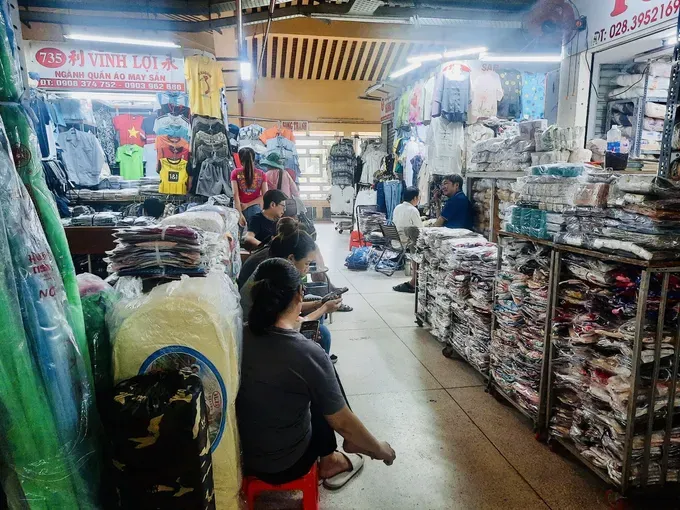
At An Dong Market in An Dong Ward, the fashion apparel section is once again illuminated, with goods neatly displayed and staff back at their posts. The atmosphere is notably more vibrant compared to early last month, when the first and second floors were desolately quiet, with numerous stalls shuttered due to anxiety over potential retroactive tax audits and scrutiny of goods’ origins.
“Most of our merchandise is sourced from China, documented with handwritten notes, and lacks official input invoices to prove its origin, so we feared inspections and penalties”, shared T.N., who specializes in fashion eyewear and plated jewelry. “Now that specialized agencies are working to resolve these issues, including a proposal to allow us to declare and pay taxes on goods without formal invoices, I’ve decided to reopen.”
With nearly 40 years of business at An Dong Market, N.N. acknowledges that professionalizing operations is essential.
“Soon, with the abolition of the fixed-tax system, we’ll have to pay tax based on actual revenue, maintain accounting records, issue and archive invoices, and invest in equipment connected to the tax agency”, she projected. “Professionalism is inevitable, so I’m considering transitioning from a business household to a formal enterprise.”
A little over two kilometers away, the area around Dong Khanh Shopping Center (also known as Soai Kinh Lam Fabric Market) in Cho Lon Ward is also bustling again. Shops along Tran Hung Dao, Do Ngoc Thanh, and Duong Tu Giang streets are seeing a steady flow of customers.
The An Dong Market Management Board is coordinating with the HCMC Market Management Department and local tax authorities to conduct training workshops. These sessions are designed to educate traders on regulations concerning product origin and the procedures for issuing electronic invoices.
Similarly, at Ben Thanh Market, management is not only organizing training but also reviewing and adjusting fixed-tax rates to reflect the current business realities of some households and promptly address traders’ concerns.
At Binh Tay Market, Head of Management Nguyen Ngoc Que Phuong reported that some elderly traders, struggling to adapt to the new business landscape or lacking support, have temporarily ceased operations to rent out or sell their stalls.
“To help traders operate effectively, since early May, we have been collaborating with tax authorities and market management forces to provide training on selling goods with clear origins and using electronic invoices”, said Head Nguyen Ngoc Que Phuong.
Deputy Director Nguyen Nguyen Phuong of the HCMC Department of Industry and Trade noted the multifaceted challenges facing traditional market traders, including pressure from e-commerce and rising operational costs.
“New regulations on e-invoicing, taxation, and mandatory social insurance have significantly impacted their businesses”, he stated. Over 50 percent of traders above the age of 50 encounter technological hurdles, express anxiety about using e-invoices, and lack accounting support. Increased costs for electricity, waste disposal, and e-invoicing equipment further compound their difficulties.
The Department has proposed that authorities consider a flexible, phased rollout for these new regulations to give traders adequate time to adapt. It also recommends financial support policies covering utilities, equipment purchases, and free e-invoice issuance.
Calls for tax reduction, crackdown on counterfeits
In Vung Tau Ward, some kiosks selling textiles, apparel, footwear, and jewelry at Vung Tau Market have reopened after a temporary close. On Ba Cu Street, one of the ward’s primary fashion retail hubs, many shops have resumed normal operations, though some prime locations have been converted into coffee shops or office rentals.
Since last year, many traders at the Ba Ria Trade Center have vacated their kiosks due to declining customer traffic. In response to these hardships, traders are urging the government to take a stronger stance against spontaneous street vending and counterfeit goods, and to implement tax reduction policies to help them navigate this difficult period.
In Lai Thieu Ward, some traditional market traders are starting to restock their inventory after a lull caused by a crackdown on counterfeit and substandard products. “We traders are discussing sourcing goods with more diverse designs, competitive prices, and better quality for our customers”, said Nguyen Thi Thoa, a 35-year-old fashion retailer in the area.
























